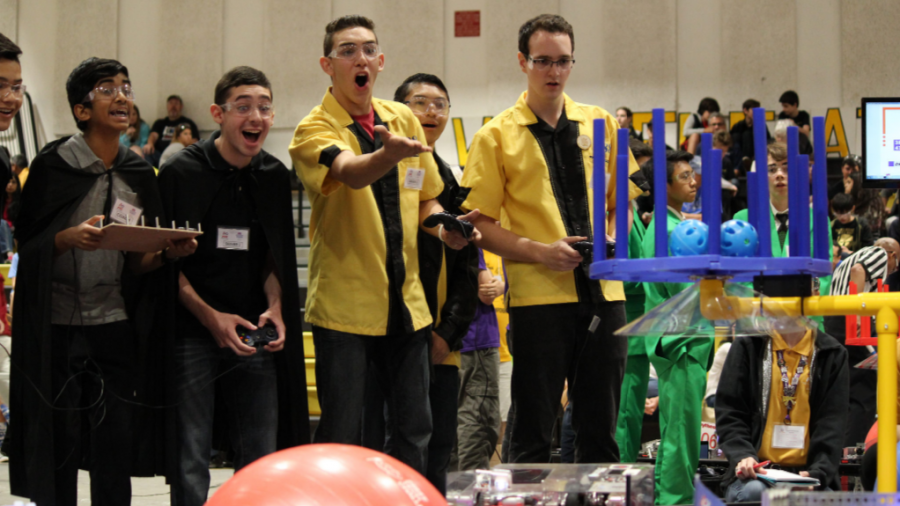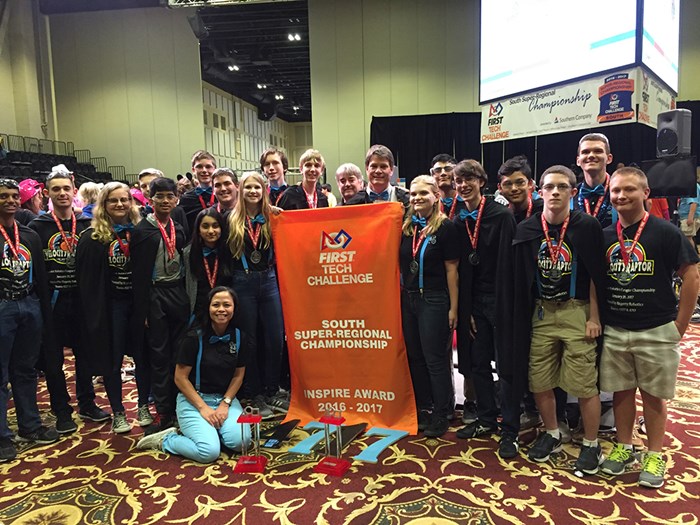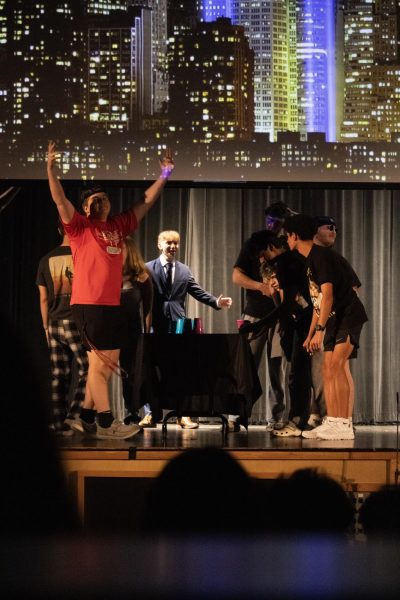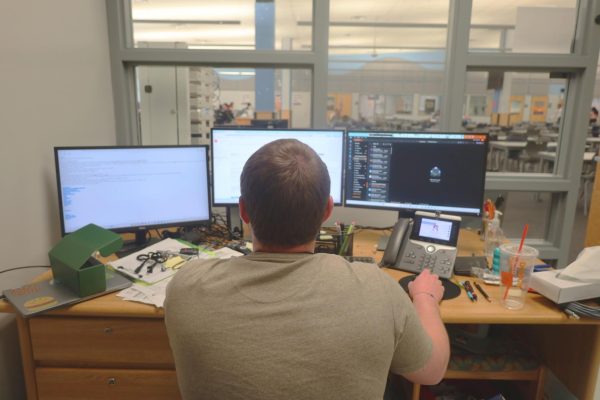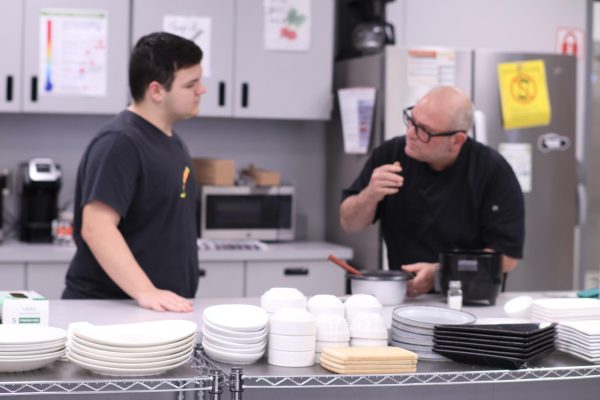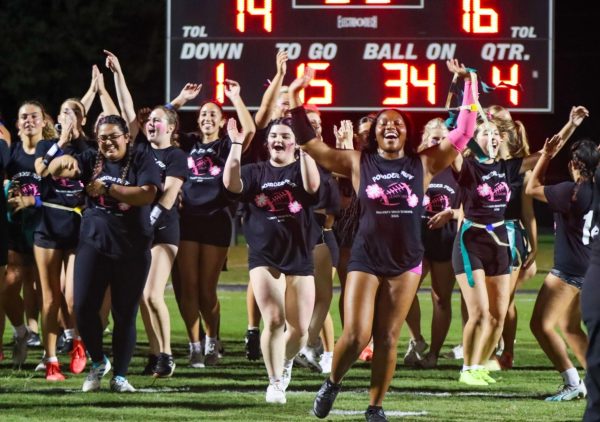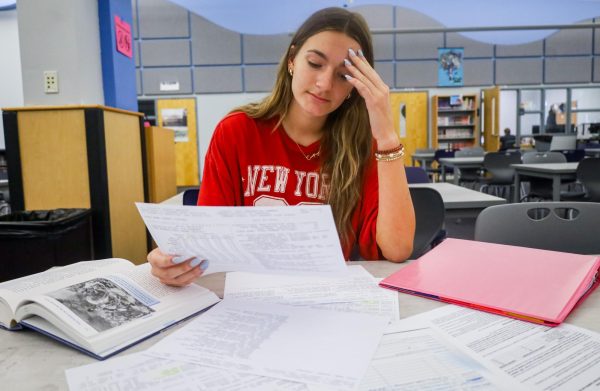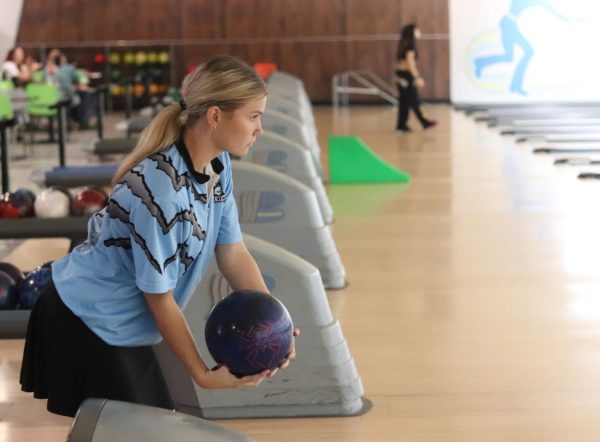Robots take over the World
Robotics team undefeated in state, national competitions as they move on to worlds
photo by FTC
Junior Nicholas Injo, freshman Neel Maity and senior Andre Pereiro along with their alliance team, Greased Lightning get excited over scoring major points in the teleop period of the game.
Tied 1-1 in the last game of the national competition, the Mechromancers had to win a tiebreaking third match in order to claim the national title.
Not only did they win the match but they went undefeated in the tournament, shattering the world record with 340 points scored without penalties during one match. This qualified them to compete at the world Championship for the second time.
The team competed at the South Super Regional National Competition in Athens, Georgia from March 23-25.
“Since this was a national competition, we expected some challenging competitors,” team leader Victoria Guise said. “It was really cool for us to hold our own against the nation’s best.”
The award winning robot, Tim Burr, named because it is mainly made out of wood, can perform autonomous tasks like shooting a ball into the center vortex, driving down a wall with a whisker sensor, sensing colors and knocking over something as large as a yoga ball to score points.
This year’s challenge is called Velocity Vortex, which closely resembles a basketball game for robots, with the addition of difficult tasks like raising a yoga size ball and placing it on top of the center vortex.
“This year our robot has a unique design that is small, lightweight and fast,” UCF Innovation Lab Director Don Harper said. “We currently hold the world record score so we will get a lot of attention at the World Championship.”
They have been working on Tim Burr since late September and participated in five competitions prior to advancing to the state competition in February where the team also won the whole thing. The robot always has improvements being made to help the team score more points during matches.
Teams are randomly paired right after the drivers’ meeting to go over the rules and remind team members about penalties. No team wants to get red or yellow cards for rough defense or bad sportsmanship.
A match includes of four robots and is divided into two parts, autonomous and teleop, driver controlled portion, and lasts 2 minutes and 30 seconds. Two robots are assigned red or blue alliance for each match and the colors can change for other matches throughout the day. A team’s alliance partner for one match may be an opponent for another match later in the day.
The autonomous period is driverless and is 30 seconds long with the robot programmed to complete tasks like pushing beacons, shooting balls into the center vortex, pushing the cap ball off the center vortex base and parking on it. It is important to have an autonomous program that performs well for each color so the team can score the maximum amount of points during this period.
“I send out the kids who aren’t driving or coaching to scout out the other teams,” head coach Po Dickison said. “We want to see what other teams can do in the autonomous and teleop periods. Every member has a task to do to help the team succeed on and off the field.”
The driving and coaching team consists of five students: junior Nicholas Injo, senior Andrew Pereiro, senior Rajiv Narayanan, freshman Neel Maity, and the programmer, sophomore Ryan Nelson.
The teleop period lasts for the remaining two minutes with two drivers and a coach controlling the robot.
The Mechromancers won the highly coveted Inspire Award, Winning Alliance Captain, Second Place Rockwell Collins Innovate Award, and Third Place PTC Design Award.
The Inspire Award is the highest award that a team can receive. The award shows that this team is able to communicate their experiences, enthusiasm and knowledge to other teams, sponsors, their community, and the judges. No other Florida team has won this award at this level.
“It felt amazing to know that our team was considered to be a model team and that we did great in all the judging categories,” sophomore Haven Carter said. “It was awesome to know that all of our hard work paid off.”
The Mechromancers have been working with a new component on Tim Burr for worlds. A Pixy camera has been added to the robot. They hope that it will help them in the autonomous mode by detecting the size and color of the balls that they need to pick up and shoot continuously.
“If we can get this to work, then it will be amazing to see,” Harper said. “No other team has done this; we want to show the world we can think outside the box.”
They have also designed a scissor lift to add to the robot to lift and cap the ball during the last thirty seconds of the match.
A team’s score is not determined only with how the robot performs in the field during matches, but what happens outside the field is even more important.
Teams must keep an up-to-date engineering notebook with daily entries, create a 3-minute team video, participate in outreach events, fundraise, and give a presentation.
Judges read and score the engineering notebooks and teams are encouraged to do self-reflections for improvement. In addition, teams must give ten-minute presentation to a separate group of judges.
Throughout the competition days, other judges, technical and non-technical, will come by a team’s tent to ask questions about their community outreach, fundraisers, robot design and programming. Members must know these answers in order to make a positive impression on the judges.
Teams must also show Gracious Professionalism at all times, meaning they help other teams-even if it means sacrificing a potential win-treating everyone with respect, and winning or losing with grace. Judges make notes on team dynamics and observe how well they work together at all times.
A team can qualify for worlds in three ways: winning nationals, winning one of the awards or getting picked in the lottery via being on a wait list. The world competition is from April 19-23 in Houston, Texas and the team hopes to continue the streak.
“This is the best season we have had yet,” robotics teacher Stefan Ibarguen said. “I typically go into a competition trying to keep low expectations, but for the past two times we have just been winning and winning.”
Your donation will support the student journalists of Hagerty High School. We are an ad-free publication, and your contribution helps us publish six issues of the BluePrint and cover our annual website hosting costs. Thank you so much!

